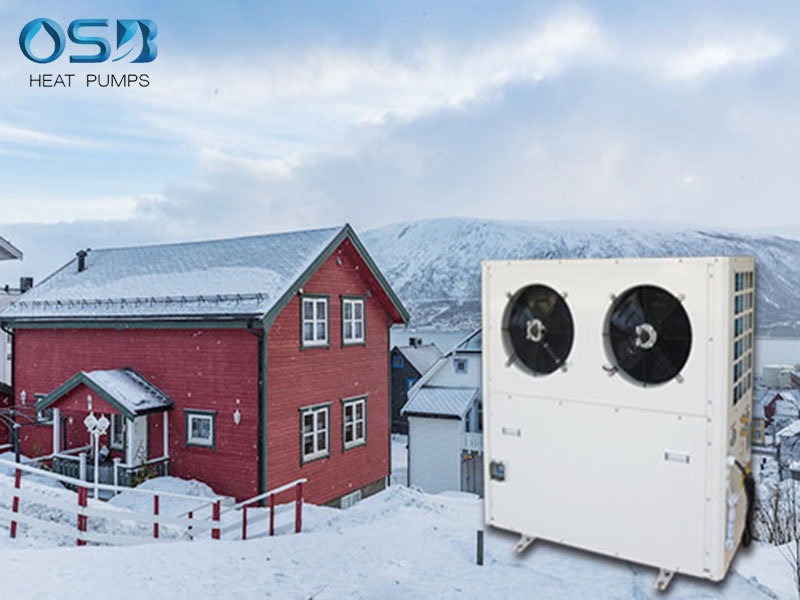
This article compares the attributes of both home heating systems to find out which one will come out on top in a Heat pump boiler vs traditional boiler standoff. Will it be the Heat pump, the veritable new kid on the block? Or the long-reigning champion, the traditional boiler?
Let’s find out.
Heat pump boiler vs traditional boiler round 1 – Efficiency
The efficiency of a home heating system is essentially how much of the energy supply is converted into useful heat energy. Historically, old traditional boilers are considered 50 – 75% efficient, which means that a half to a quarter of the energy supplied to the traditional boiler was wasted. Modern high-efficiency traditional boilers (gas, LPG and oil) and biomass traditional boilers have a much-improved efficiency of around and above 90%, with only small amounts of heat lost through the flue.
On the other hand, the efficiency of Heat pumps can, in effect, reach as high as 350% (or in technical terms, a Coefficient of Performance of 3.5). This is because Heat pumps work by absorbing the heat occurring naturally outside of your home and moving it indoors.
Heat pump boiler vs traditional boiler: 1 – 0
Heat pump boiler vs traditional boiler round 2 – Lifespan
A typical air source Heat pump lasts for around 15 years, but allegedly newer models and ground source Heat pumps have a lifespan of around 25 years. This longevity is put down to their robust design, and with only a few moving parts, there’s very little that can actually go wrong.
In comparison, a typical gas or LPG traditional boiler’s lifespan is around 8 – 12 years.
Heat pump boiler vs traditional boiler: 2 – 0
Round 3 – Heat pump boiler & traditional boiler Space
The outdoor fan unit of an air source Heat pump usually takes up as much space as a washing machine. This is usually (but not always) connected to an indoor heat exchanger (or hydrobox), which is roughly the same size as a regular traditional boiler. Finally, the hydrobox connects to a hot water cylinder, just like a regular gas traditional boiler.
A ground source Heat pump requires roughly twice the floor area of your home (including all floors) to be split and dug into trenches, where long pipes are laid. This is obviously a large plot of land (and not a quick installation), but once these pipes are buried underground, it’ll be unnoticeable once the flora has regrown or concrete re-laid. The actual ground source Heat pump unit sits inside your home, and can be anywhere between the size of a regular traditional boiler down to that of a large shoebox.
On the other hand, some modern traditional boilers (or ‘combi’ traditional boilers) take away the need for a hot water cylinder altogether, heating water straight from the water mains. Generally speaking, these are only suitable in small houses or flats though.
So if you’re including the outdoor space required, the ground source Heat pump is the biggest loser for this round. However, if you’re only comparing which heating system takes up the most room insideyour home, the biomass traditional boiler would probably be the biggest. These pellet-burning green heating systems are larger than standard gas traditional boilers, although this will depend on the size of your house and the demand for heat.
Heat pump boiler vs traditional boiler: 2 – 0
Heat pump boiler vs traditional boiler round 4 – Upfront cost
If you’re looking for the quickest and cheapest option, you’re better off sticking with a gas traditional boiler. The Energy Saving Trust (EST) estimates that a standard gas traditional boiler replacement will set you back on average £2,300.
For homeowners not on gas mains, the cost of an air source or ground source Heat pump by comparison is between £6000 – £8000 (air source, EST) or £10,000 – £18,000 (ground source, EST). However, you will be able to claim the vast majority of this back from the Renewable Heat Incentive(subject to performance). Similarly, you can receive a tax-free RHI income with a biomass traditional boiler, which is predicted to cost £8,000 – £15,000 (EST).
Considering a heat pump water heater’s longevity, it’s worth noting that you may also need to replace your traditional boiler twice in the space of one heat pump water heater’s lifetime.
Heat pump boiler vs traditional boiler: 2 – 1
Remark:
Some of the articles are taken from the Internet. If there is any infringement, please contact us to delete it. If you’re interesting in heat pump water heater products,please feel free to contact OSB heat pump water heater. We are your best choice.

